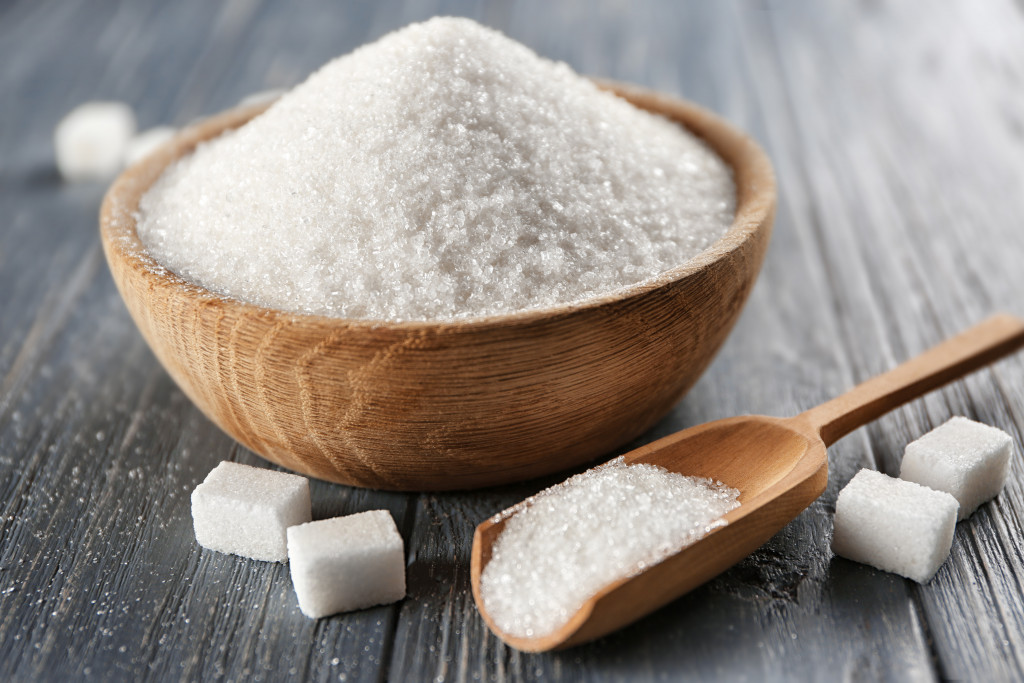- Sugar is a carbohydrate found in fruits, vegetables, and processed foods.
- Added sugar is a significant source of empty calories, leading to weight gain, tooth decay, and various health problems.
- The average American consumes almost 17 teaspoons of added sugar daily, far above the American Heart Association’s recommendation.
- Sugar can be addictive, leading to overeating and obesity.
- Avoiding sugar can be done by making healthier choices, reducing sugary drinks, and using alternative sweeteners like monk fruit.
Sugar is a common ingredient in people’s diets, but what exactly is it, and how does it affect your life? Sugar is a type of carbohydrate that is naturally found in many foods, including fruits and vegetables. However, it is also added to many processed foods to improve taste and texture. While your bodies need some sugar to function properly, too much sugar can negatively affect your health. Here’s a dive into the science of sugar, its effects on your body, and how to make healthier choices in your diet.
Types of Sugar
Firstly, let’s talk about the types of sugar. There are two types of sugar: naturally occurring sugar and added sugar. Naturally occurring sugar is found in fruits, vegetables, dairy products, and starchy foods like bread and pasta. These foods also contain important nutrients like fiber, vitamins, and minerals. Added sugar, on the other hand, is sugar that is added to processed foods like candy, sodas, baked goods, and even sauces and condiments. Added sugar can come in many forms, such as high-fructose corn syrup, honey, molasses, and maple syrup.
Sugar Consumption
So, how much sugar should we be consuming? The American Heart Association recommends no more than six teaspoons (or 24 grams) of added sugar per day for women and nine teaspoons (or 36 grams) for men. Unfortunately, many of us are consuming far more than that. It’s estimated that the average American consumes almost 17 teaspoons of added sugar daily, which adds up to about 57 pounds of added sugar annually!
Problems With Sugar
Too much sugar can bring problems to your life. Here are the main problems associated with sugar:

Empty Calories
The main problem with added sugar is that it provides empty calories, meaning it has no essential nutrients. It also causes a spike in blood sugar levels, followed by a crash that can leave you tired and sluggish. Over time, excess sugar can contribute to weight gain, tooth decay, and an increased risk of chronic diseases like type 2 diabetes and heart disease.
Addiction
Sugar has been compared to addictive drugs like cocaine in the way it activates the reward centers in our brains. When you eat sugar, your brain releases dopamine, a feel-good chemical that makes us crave more. This cycle can quickly become addictive, leading to overeating and weight gain. The more processed sugar you eat, the more your taste buds become desensitized, requiring you to consume even more sugar to achieve the same level of satisfaction.
Obesity
Obesity rates have steadily risen over the past few decades, and sugar consumption is one of the main culprits. Drinking soda, eating candy, and indulging in desserts all contribute to weight gain and obesity, which can lead to various health problems such as heart disease, diabetes, and stroke.
Oral Damage
Sugar is one of the primary causes of tooth decay. When you consume sugar, the bacteria in your mouth feast on it, producing acid that eats away at your tooth enamel. This can lead to cavities, tooth decay, and tooth loss. The World Health Organization recommends limiting your sugar intake to no more than six teaspoons per day, but many people consume much more.
Avoiding Sugar
Thankfully there are ways you can avoid sugar in your diet. Here are some of those ways:

Make Healthier Choices
Making healthier choices in your diet is key to reducing your sugar intake. Start by choosing whole, unprocessed foods instead of processed ones. Focus on foods high in fiber, protein, and healthy fats, as these nutrients help keep you full and satisfied. When you do choose processed foods, be sure to check the labels for added sugar. Look for ingredients like high-fructose corn syrup, cane sugar, and maltodextrin, and try to avoid products with these ingredients as much as possible.
Reduce Intake of Sugary Drinks
Another way to reduce sugar intake is to limit sugary drinks, such as soda, sports drinks, and sweetened teas and juices. These beverages can be a significant source of added sugar, so try replacing them with water, unsweetened tea, or sparkling water.
Use Monk Fruit Sweeteners
Monk fruit is a highly studied fruit when it comes to alternative sweeteners. It has been found that a high-quality pure monk fruit sweetener can be up to 200x sweeter than sugar while still being low-calorie and having virtually no impact on blood sugar levels. This makes it an excellent choice for those looking to reduce their sugar intake without sacrificing sweetness.
Sugar is integral to many people’s diets, but too much can seriously affect your health. By making healthier choices, you can reduce the amount of sugar in your life and make more informed decisions about what you put into your body. Once you do, you’ll feel the benefits of a healthier lifestyle.

